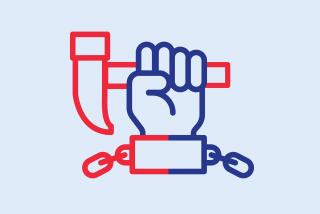Prison Guards’ Sick Leave Usage Soars as Rules Shift
SACRAMENTO — In the four months after Gov. Gray Davis agreed to a new and looser sick-leave policy sought by the prison guards’ union, sick leave by the officers jumped 20% over the same period last year.
The new policy is part of the labor agreement negotiated by the Davis administration and the California Correctional Peace Officers Assn., and approved by the governor and Legislature in January. The pact also promises correctional officers a pay increase of up to 34% over the next five years, at a cost of $680 million by 2006, when the final raise kicks in.
Critics say other provisions, such as the one dealing with sick leave, will also add to the state costs. If the current trend of officers calling in sick continues for the rest of the year, the jump will cost the state an extra $12.5 million. Spokesmen for the Department of Corrections and the union that represents California’s 27,000 prison officers said they were unaware of any disease outbreak afflicting prison workers during the first four months of 2002. Rather, they cite the new labor contract, and the limits it places on wardens who want to discipline officers for using extraordinary amounts of sick leave. A union executive said the contract gives officers “newfound freedom” to call in sick without fear of retribution.
The Corrections Department reported that the related cost of overtime also jumped 20%, to $58.4 million, in the first four months of 2002, worsening the prison system’s $277-million budget shortfall and the state’s projected deficit of nearly $24 billion. Officers are forced to work overtime to cover for colleagues who call in sick.
In contrast to the soaring use of sick time by state prison guards, the state’s other major law enforcement agency, the California Highway Patrol, reports that sick leave increased less than 1% in the first four months of the year, at a cost of $33,796 more than last year’s tab for that period. Overtime costs at the CHP rose 7%.
Some lawmakers and others have criticized the contract with the prison guards, saying its terms are too generous and questioning the Davis administration’s role in cutting the deal. The guards’ union has given Davis $662,000 in direct and indirect donations since he took office in 1999, and it spent $2 million to help elect him in 1998.
As the use of sick time in state prison grows, other records suggest that overtime is accounting for a large percentage of some officers’ salaries. Records released by the state controller’s office show dozens of prison officers making such heavy use of overtime that they will double their pay, which is $55,248 for veterans. With overtime earnings through May, at least 80 correctional officers will earn $100,000 or more in the fiscal year that ends Sunday.
“It’s crazy that correctional officers are making more than schoolteachers,” state Sen. John Vasconcellos (D-Santa Clara) said.
Sen. Richard Polanco (D-Los Angeles) called the run-up in sick leave and overtime “unbelievable, unreal,” adding: “They’re going to bankrupt the state at the rate they’re going.”
The costs are relatively small given California’s overall budget of $100 billion. But as lawmakers consider deep cuts and tax increases as they try to close the budget gap, Polanco said it represents “a lot of money to people facing cutbacks in health care or closure of senior services.”
Davis signed legislation implementing the new contract in mid-January. Two months later, the California Correctional Peace Officers Assn. contributed $251,000 to the Democratic governor’s reelection campaign, bringing its total to $662,000 in direct and indirect donations since 1999.
‘Extraordinary Use’ List
At the union’s behest, Davis administration negotiators eliminated one tool used by wardens to discipline officers who would call in sick frequently--the “extraordinary use of sick leave” list.
Under that old system, wardens could place employees on the list if they called in sick more than five times covering nine days in a year; if employees repeatedly took sick days immediately after days off; or if they called in sick after having already been denied a day off. Once on the list, employees were required to provide notes from doctors justifying sick leave.
The new contract says “employees shall not be denied the right to use sick leave or be subjected to any corrective or disciplinary action, or in any manner discriminated against for use or attempting to exercise their right to use sick leave based solely on the amount or frequency of use.”
Corrections Department spokeswoman Terry Thornton said, “The new agreement has taken away one of the management tools for managing sick leave.” Joe McGrath, warden at the maximum-security Pelican Bay State Prison in Crescent City, told lawmakers in April that the contract creates “significant” challenges for managers trying to limit sick leave abuse.
“I’m going to have a real uphill battle when I start in on the correctional officer that I know was out fishing yesterday,” McGrath told a budget subcommittee chaired by Polanco.
Defending the new sick leave policy, Mike Jimenez, executive vice president of the officers’ union, said officers are not abusing it, adding, “I don’t know that a 20% increase is totally out of the norm for this occupation.
“Officers for the first time feel they can use sick leave without fear of intimidation,” he said. “There is a newfound freedom here. In the past, the Department of Corrections has used tactics that were intimidating and threatening.”
Department of Personnel Administration Director Marty Morgenstern, the Davis appointee who oversees labor negotiations, said he agreed with the union that the “extraordinary use of sick leave” list caused resentment among prison employees. He said one reason for the jump in sick leave could be that officers are “blowing off steam” now that the list is no longer used.
“The union made to me a very good case that it was a highly unfair rule,” Morgenstern said, noting that officers could be undergoing chemotherapy and end up on the list. “It is very difficult to run a prison ... and we make allowances for that. But that [rule] just seemed too unfair.”
Davis Press Secretary Steve Maviglio said that upon being informed of the jump in sick leave, the governor directed that Morgenstern “immediately review the situation and take all actions to make sure the system is not abused.” Maviglio added, however, that the “extraordinary use of sick leave” list was unique to the Corrections Department, and said, “This new contract reflects what every other state employee has.”
In January, the month that Davis signed the contract, prison guards’ use of sick time rose to 8,164 hours, 5% above the 2001 level for that month. In February, it climbed by almost 15,000 hours, or 10.6% more than the previous February. In March, sick leave increased by 43,634 hours, or 30%. And by April, sick time had shot upward by 46,543 hours, more than 33% above April 2001.
Line officers are not the only ones calling in sick. During the first third of the year, correctional sergeants’ use of sick leave shot up 36.9% after having dropped during the same period last year.
No Bonus Pay Included
As negotiations began over the new contract, Corrections Department officials sought authority to provide financial incentives to officers who limited their use of sick time. However, the final contract includes no such bonus pay. Morgenstern said the department’s suggestions would not have saved the state money, or would have been rejected at the bargaining table.
Use of sick leave adds to prison costs by driving up overtime, for which officers receive pay at the rate of time and a half. Corrections spokeswoman Thornton said the department’s overtime has been higher lately because of the heavy use of sick time and because many officers who are reservists have been called to active military duty. She predicted that overtime costs will abate as the department fills about 1,100 vacancies for correctional officers.
Records released by state Controller Kathleen Connell suggest that officers are making more use of overtime now than they were two years ago, when the Bureau of State Audits found overtime to be so lucrative that 5,000 correctional officers made more in annual pay than their direct supervisors in the 1998-99 fiscal year.
“With overtime earnings so high,” the audit said, “many lower-level custody staff may be content to remain in their present positions and not seek advancement.... In fact, department officials told us that some sergeants and lieutenants have asked to be demoted to the rank of correctional officer.”
Connell’s records show that at San Quentin State Prison, at least 10 officers stand to make more this year than wardens’ pay of $100,932. At the top, one officer logged 1,731 hours of overtime in the 11-month period ending in May, grossing an extra $69,831. That officer stands to make $125,079 by the end of the fiscal year June 30--or $1,824 more than the head of the Corrections Department.
More to Read
Get the L.A. Times Politics newsletter
Deeply reported insights into legislation, politics and policy from Sacramento, Washington and beyond. In your inbox three times per week.
You may occasionally receive promotional content from the Los Angeles Times.










